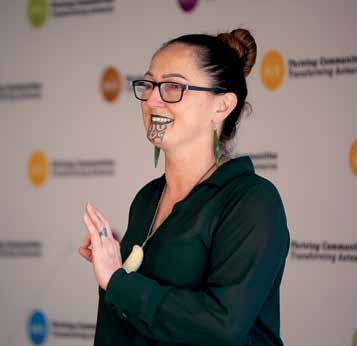
At our annual conference in 2021, Judge Andrew Becroft talked about the challenge of meeting the needs of the neurodiverse and the fact that many of our rangatahi in prison have undiagnosed conditions. Our 2022 ACE Conference was an opportunity to examine neurodiversity from a broad perspective and provide tools for practitioners to better support their neurodiverse learners.
Psychiatrist Dr Diana Kopua (Ngati Porou) opened the conference with a challenge of her own – “How can we talk about neurodiversity when we haven’t addressed racism? Outcomes don’t show that we are treated the same.” She encouraged us to confront our racist history in Aotearoa and create a space for disagreement and discomfort. Colonisation has affected us all.
 Dr Diana also shared her personal learning journey and talked about the disconnection from ancestral stories which blocks healing. She has developed a model, Mahi a Atua which uses indigenous ways to create a therapeutic pathway for Māori by Māori. She encouraged us to create a culture of feedback and constantly investigate our responses to situations because we all carry biases.
Dr Diana also shared her personal learning journey and talked about the disconnection from ancestral stories which blocks healing. She has developed a model, Mahi a Atua which uses indigenous ways to create a therapeutic pathway for Māori by Māori. She encouraged us to create a culture of feedback and constantly investigate our responses to situations because we all carry biases.
A panel followed Dr Diana’s presentation to consider definitions of neurodiversity. Dr Karen Waldie from Auckland University reminded participants that brain diversity is vital for evolution and all cognitive functions are on a spectrum. Neurodiverse conditions should not be described as “disorders” or “gifts” as in “the gift of dyslexia.” Most people with dyslexia do not view it in this way. Many are not “very creative” nor do they possess a photographic memory as suggested by stereotypes. She added that labels can be comforting and an opportunity to seek information and define strengths and challenges.
Sara Williams outlined how the Tertiary Education Commission is encouraging tertiary providers to adopt a learner-centred approach. She acknowledged that equity is hard to achieve when our education system is still based on a Victorian model. The TEC Continuous Improvement Framework asks providers to consider how they are addressing issues of equity through teaching pedagogy and practice and providers receiving over five million dollars in funding are required to submit a Disability Action Plan. The Tertiary Education Commission is also working on modules for Dyslexia, Dyscalculia, Dyspraxia, ADHD and Autism.
Naomi Saluni Tavau brought a Pasifika perspective to the panel emphasising the importance of setting the bar high for our learners “If you aim for nothing, you will achieve nothing.” She described a number of strengths-based programmes underlined by the three ‘Ps’ – Pasifika Principles (love, respect, family, service, reciprocity), Partnership (between learner and teacher) and Practical (using all the senses).
The conference workshop programme invited participants to take a closer look at areas of particular interest to them. These included an introduction to Ako Aotearoa’s Dyslexia Friendly Quality Mark, how neurodiversity is addressed in Aged Care, what brain imaging reveals about the neurodiverse brain and managing stress and anxiety through an understanding of neurobiology.
On Day 2, participants heard directly from learners and whānau about the impact of neurodiversity and got to experience workshops led by learners.
 Ali and Nikau Cowley shared their creative learning journey and ran a workshop on puppetry while Rich Rowley and Kate Bruce from Brain Badge offered an approach to breaking down barriers for the neurodiverse in the workplace. Pip Block from A1 Student in Auckland offered an introduction to the Arrowsmith programme based on neuroscience and Peter Foaese from the Children’s Commission shared the findings of the recently published Our Kind of School Report.
Ali and Nikau Cowley shared their creative learning journey and ran a workshop on puppetry while Rich Rowley and Kate Bruce from Brain Badge offered an approach to breaking down barriers for the neurodiverse in the workplace. Pip Block from A1 Student in Auckland offered an introduction to the Arrowsmith programme based on neuroscience and Peter Foaese from the Children’s Commission shared the findings of the recently published Our Kind of School Report.
Opportunities for reflection were provided by Jennifer Leahy and Tai Samaeli (in brightly-coloured wigs) and through a kava ceremony led by Dr Edmund Fehoko. MC Pale Sauni also wove the many threads of the conference together while keeping energy levels high. The annual ACE Aotearoa Awards were presented at the conference dinner.
Our videographers, Big River, captured a number of conference presentations and these will be available on the conference website together with workshop slides. We were also fortunate to have Live Illustrators capturing our opening sessions. Their illustrations will also be available on the website.
Our 2022 ACE Conference was a joyful occasion and a chance to celebrate diversity in all its forms in our preferred way, kanohi ki te kanohi. We are especially grateful to our learners and whanau who by sharing their authentic selves opened a window for us into their worlds.
